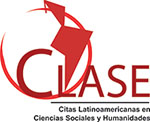Nuevas herramientas y recursos para la enseñanza de la química: experiencias exitosas y desafíos
DOI:
https://doi.org/10.23857/dc.v8i3.2810Palabras clave:
quÃmica, enseñanza, tic, educaciónResumen
Las nuevas tecnologías ofrecen hoy en día la posibilidad de innovación y creatividad en la tarea de enseñanza de los profesores de todas las óreas del conocimiento; particularmente, la asignatura de Química brinda la posibilidad de simular procesos que son difíciles de observar en las aulas o laboratorios. Este artículo, busca dar a conocer experiencias que han sido aplicadas en algunos casos en la enseñanza de la Química a través de una revisión bibliogrófica, para mostrar una perspectiva actual y resaltar prócticas exitosas. La revisión permitió concluir que todas estas experiencias han tomado a la tecnología como punto de partida, buscando mejorar sus metodologías de enseñanza y que, ademós, los profesores buscan nuevas herramientas, de preferencia gratuitas, con el fin de captar la atención de sus estudiantes.
Citas
Aljawarneh, S. A. (2020). Reviewing and exploring innovative ubiquitous learning tools in higher education. Journal of computing in higher education, 32(1), 57-73.
Almeida, F., & Simoes, J. (2019). The role of serious games, gamification and industry 4.0 tools in the education 4.0 paradigm. Contemporary Educational Technology, 10(2), 120-136.
An Applied Research-Based Approach to Support Chemistry Teachers during the COVID-19 Pandemic, (2020) [Accessed through] [Online PDF] <https://www.ncbi.nlm.nih.gov/pmc/articles/PMC7497632/> [Accessed on 04/06/2022]
Application interactive methods and technologies of teaching chemistry, (2018) [Accessed through] [Online PDF] < https://www.degruyter.com/document/doi/10.1515/cti-2018-0031/html?lang=en> [Accessed on 04/06/2022]
Boss, S., & Larmer, J. (2018). Project based teaching: How to create rigorous and engaging learning experiences. ASCD.
Chen, T. L., Kim, H., Pan, S. Y., Tseng, P. C., Lin, Y. P., & Chiang, P. C. (2020). Implementation of green chemistry principles in circular economy system towards sustainable development goals: Challenges and perspectives. Science of the Total Environment, 716, 136998.
Development and implementation of educational resources in chemistry with elements of augmented reality, (2020) [Accessed through] [Online PDF] < http://ceur-ws.org/Vol-2547/paper12.pdf> [Accessed on 04/06/2022]
Dietrich, N., Kentheswaran, K., Ahmadi, A., Teychení©, J., Bessií¨re, Y., Alfenore, S., ... & Hí©brard, G. (2020). Attempts, successes, and failures of distance learning in the time of COVID-19. Journal of Chemical Education, 97(9), 2448-2457.
Ferrell, J. B., Campbell, J. P., McCarthy, D. R., McKay, K. T., Hensinger, M., Srinivasan, R., ... & Schneebeli, S. T. (2019). Chemical exploration with virtual reality in organic teaching laboratories. Journal of Chemical Education, 96(9), 1961-1966.
JCE Chemical Education Xchange, (2022) [Accessed through] [Online PDF] <https://pubs.acs.org/doi/pdf/10.1021/ed300790q?ref=vi_teaching-chemistry-online> [Accessed on 04/06/2022]
Jeffery, K. A., & Bauer, C. F. (2020). Students’ responses to emergency remote online teaching reveal critical factors for all teaching. Journal of Chemical Education, 97(9), 2472-2485.
Kalogiannakis, M., Papadakis, S., & Zourmpakis, A. I. (2021). Gamification in science education. A systematic review of the literature. Education Sciences, 11(1), 22.
Kiryakova, G., Angelova, N., & Yordanova, L. (2018). The potential of augmented reality to transform education into smart education. TEM Journal, 7(3), 556.
Lapitan Jr, L. D., Tiangco, C. E., Sumalinog, D. A. G., Sabarillo, N. S., & Diaz, J. M. (2021). An effective blended online teaching and learning strategy during the COVID-19 pandemic. Education for Chemical Engineers, 35, 116-131.
Mamlok-Naaman, R., Eilks, I., Bodner, G., & Hofstein, A. (2018). Professional development of chemistry teachers: Theory and practice. Royal Society of Chemistry.
Mitsos, A., Asprion, N., Floudas, C. A., Bortz, M., Baldea, M., Bonvin, D., ... & Schí¤fer, P. (2018). Challenges in process optimization for new feedstocks and energy sources. Computers & Chemical Engineering, 113, 209-221.
Noor, S., Isa, F. M., & Mazhar, F. F. (2020). Online teaching practices during the COVID-19 pandemic. Educational Process: International Journal, 9(3), 169-184.
Petillion, R. J., & McNeil, W. S. (2020). Student experiences of emergency remote teaching: Impacts of instructor practice on student learning, engagement, and well-being. Journal of Chemical Education, 97(9), 2486-2493.
Using Technology to Support Chemistry Teaching and Learning, (2018) [Accessed through] [Online PDF] < http://pubs.sciepub.com/wjce/6/5/4/index.html> [Accessed on 04/06/2022]
Web-based discussions in teaching and learning, (2021) [Accessed through] [Online PDF] <https://link.springer.com/content/pdf/10.1007/s10639-021-10725-7.pdf> [Accessed on 04/06/2022]
Publicado
Cómo citar
Número
Sección
Licencia
Authors retain copyright and guarantee the Journal the right to be the first publication of the work. These are covered by a Creative Commons (CC BY-NC-ND 4.0) license that allows others to share the work with an acknowledgment of the work authorship and the initial publication in this journal.






